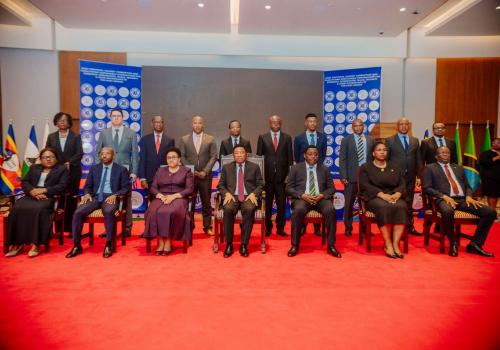The Southern African Development Community (SADC) marked a major milestone in its fight against corruption by hosting the Fourth Regional Workshop of Anti-Corruption Agencies from 4–6 August 2025 in Arusha, United Republic of Tanzania. The event commemorated 20 years since the adoption of the SADC Protocol Against Corruption.
Opening the workshop, SADC Executive Secretary H.E. Elias M. Magosi emphasised the urgency of sustained action, warning that corruption continues to undermine peace, prosperity, and inclusive development. He called for stronger regional cooperation and national accountability.
Held under the theme “The SADC Protocol Against Corruption @20: Facilitating Sustainable Cooperation for Economic Integration, Peace, Security, and Good Governance,” the workshop provided a platform to evaluate progress, address persistent challenges, and renew commitment to the Protocol’s goals.
Achievements over the decades include:
Strengthened legal and enforcement frameworks
Criminalisation of bribery involving foreign officials
Improved judicial cooperation and mutual legal assistance
Integration of anti-corruption education in schools
Creation of financial intelligence units and asset recovery offices
Despite these gains, delegates acknowledged gaps in private sector regulation, whistleblower protection, and access to public information, areas critical to full Protocol compliance.
The workshop convened representatives from eleven Member States and key partners, including the United Nations Office on Drugs and Crime (UNODC), the African Union Advisory Board Against Corruption (AUABC), and the Basel Institute on Governance.
Tanzanian Prime Minister Hon. Kassim Majaliwa Majaliwa (MP) officially opened the event, highlighting national reforms such as legislation on illicit enrichment, civic education, and digital innovations in procurement and revenue systems. He urged Member States to treat corruption as a regional security threat and strengthen cross-border cooperation.
Hon. Dr. Stergomena Lawrence Tax, Minister of Defence and National Service, reaffirmed Tanzania’s leadership as Chair of the SADC Organ on Politics, Defence, and Security Cooperation. She called for deeper collaboration and alignment of anti-corruption efforts with peace and development priorities.
H.E. Magosi praised Member States for legislative and institutional progress and spotlighted the successful piloting of the Regional Anti-Corruption Effort Index (SACEI) by Tanzania and Mauritius, encouraging broader adoption.
Global experts shared insights on legal gaps, institutional capacity, and regional cooperation. Member States exchanged best practices in whistleblower protection, procurement monitoring, and specialized anti-corruption courts.
Key Recommendations from the workshop include:
Invest in digital forensics and cybercrime tools
Expand laws to cover private sector corruption
Engage media in public education and investigations
Update the Protocol to reflect emerging threats
Harmonize whistleblower protection across Member States
Promote youth engagement via social media
Leverage AI and blockchain in anti-corruption strategies
Streamline international reporting obligations
Scale up SACEI participation
Strengthen asset recovery through legal reform and financial sector collaboration
As the Protocol enters its third decade, participants reaffirmed their shared commitment to building a transparent, accountable, and corruption-free SADC region.

